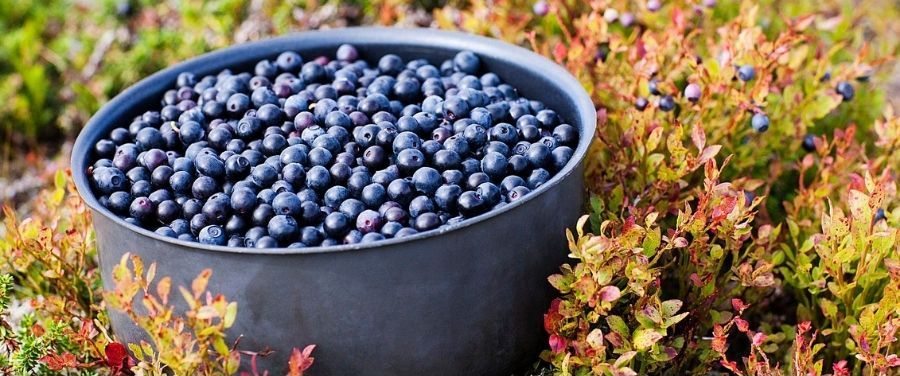What is Bilberry?
Bilberry is a small fruit that is globular, with a flat top, about the size of a black currant. It is about 5 to 9 mm in diameter. They are dark in color and usually appear near black with a slight shade of purple color. Belongs to the Ericaceae family, Bilberries (Vaccinium myrtillus) are also known as whortleberry, wimberry or European blueberry.
It has much in common with the Vaccinium cyanococcus (American blueberries). To distinguish it from other Vaccinium relatives, bilberry is also known as common bilberry or blue whortleberry. Other regional names may include bog bilberry, heidelbeere, huckleberry, blaeberry, hurtleberry, huckleberry, myrtleberry, whinberry, winberry and fraughan.
Bilberry: Origin and History
Bilberry is native to Continental Northern Europe, Ireland, the British Isles, Iceland and across the Caucasus into Northern Asia. It is found in the wild on heathlands and in acidic soils.
Bilberry has been used in traditional European medicine for nearly 1,000 years. Bilberry fruits have been used directly or as tea or liqueur in the traditional Austrian medicines in the treatment of disorders of the gastrointestinal tract and diabetes. (SEE ALSO: How Acai Berries are Good for Your Health)
Various bilberry herbal supplements are also available in the market. These supplements are used to treat diabetes, diarrhea, cardiovascular and other health conditions. Because of its high concentrations of anthocyanins, many researchers are interested in bilberry.
In cooking purposes, the bilberry fruit is commonly used for the same purposes as the Vaccinium cyanococcus, such as cakes, muffins, jams, cookies, sauces, juices, candies and syrups. Bilberry leaf is also used in the traditional medicines for different conditions, including scurvy, infections, diarrhea, burns and diabetes.
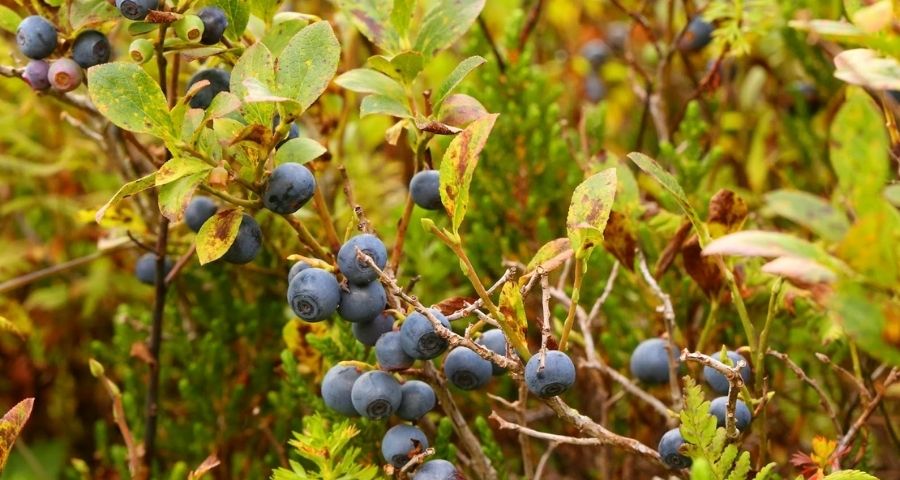
Nutritional Facts
Similar to other berries such as blueberries, huckleberries, acai berries, bilberries are the richest natural source of anthocyanin. Anthocyanin is a compound that provides bilberry its dark—blue color. Along with anthocyanin, it also contains other phenolic components such as tannins, quercetin, pectin, and catechins.
It also contains carbonic acids, alkaloids, and a range of vital nutrients including vitamins A, vitamin B1, vitamin B2, vitamin C, vitamin E, and K. It also contains minerals such as chromium, manganese, zinc, and iron.
Per 100-gram serving of bilberry provides —
- Calories: 44 Kcal.
- Protein: 0.7 gram
- Carbohydrates: 11.5 gram
- Total Dietary Fiber: 2.8 gram
- Calcium: 15 mg
- Iron: 0.8 mg
- Magnesium: 7 mg
- Phosphorus: 9 mg
- Potassium: 103 mg
- Manganese: 3.3 mg
- Vitamin A: 1.08 µg
- Beta Carotene: 13 µg
- Vitamin B1 (Thiamin): 0.03 mg
- Vitamin B2 (Riboflavin): 0.03 mg
- Vitamin B3 (Niacin): 0.583 mg
- Vitamin B5 (Pantothenic acid): 0.16 mg
- Vitamin B6 (Pyridoxine): 0.06 mg
- Vitamin B9 (Folate): 6 µg
- Vitamin C (Ascorbic acid): 44 mg
Science-Based Health Benefits of Bilberries
Here are some proven health benefits of bilberries; including —
1. Rich in Nutrients:
Bilberries are a fruit rich in healthy antioxidants and nutrients. (SEE ALSO: Goji Berries: Origin, Nutrition, Health Benefits and Side-Effects)
Accordingly, European blueberries can be expected to offer about 85 calories, 4-gram fiber, and 15 grams of naturally—occurring sugar per 148 grams serving. In addition to this, bilberries also contain around 85% of water, as well as good amounts of vitamin C, vitamin K and manganese.
2. Improved Vision Health:
Bilberries also may help to improve vision, particularly night vision. A research held on the people with glaucoma, found that taking 120 mg of bilberry anthocyanins regularly may improve visual functioning by 30 percent.
An another study reveals that consuming about 160 to 480 mg of powdered European blueberries (bilberry) extract regularly may significantly reduce eye dryness and other symptoms of eye fatigue. However, more research are needed to confirm these benefits.
3. May Reduce Inflammation:
Inflammation is believed to be the root cause of many health diseases. Bilberries may help in this regard. European blueberries contains a high amount of anthocyanins, which are the antioxidants with anti—inflammatory properties.
According to a study, people who consumed 300 mg of bilberry anthocyanins regularly experienced 38 to 60 percent reduction in inflammatory markers.
An another study revealed that consuming about 330 ml of bilberry juice daily may significantly reduce the markers of inflammation, compared with a placebo. However, more research are needed to prove these benefits.
4. May Lower Blood Sugar Levels:
Bilberries may also act as a natural herbal remedy to lower blood sugar levels in the people with type-2 diabetes. Many health experts believe that berries have the ability to prevent the breakdown and absorption of carbohydrates in the gut, similar to some medications used to lower blood sugar.
A research held on animals states that the anthocyanins contents present in the bilberries may stimulate the secretion of insulin, which is needed to help to move sugar from the blood into the cells.
According to an another study, the bilberry extract may reduce the levels of blood sugar in the adults with type-2 diabetes more effectively than a placebo. (SEE ALSO: 5 Delicious Homemade Acai Bowl Recipes)
An another 8-week scientific research states that a diet enriched with fresh European blueberries may increase insulin secretion in people with metabolic syndrome, a group of conditions that increases the risk of stroke, type-2 diabetes, and heart disease.
5. Promotes Heart Health:
Bilberries may also benefit heart health. European blueberries are rich in vitamin K, which is known to prevent the formation of blood clots, and reduces the risk of heart attack and stroke.
In an 8-week study, 35 people were regularly given a mixture of various berries, including bilberries, and experienced improved blood pressure, platelet function, and HDL (high—density lipoprotein) cholesterol levels. All of them are linked to a healthier heart.
In another 12-week study, people who took 320 mg of anthocyanins from blackcurrants and European blueberries (bilberries) regularly experienced an increase of 11 percent in HDL or good cholesterol, a 14 percent reduction in LDL (low-density lipoprotein) cholesterol levels, compared with less than a 1 percent reduction in the placebo group. (SEE ALSO: Blueberry Benefits : 10 Proven Benefits of Blueberries)
6. Boost the Immune System:
Due to their high antioxidant and vitamin C content, bilberries can help to keep your immune system in a healthy state. It may also have anti-microbial benefits.
European blueberries (bilberries) also contain high anthocyanin content, a compound that is known to aid in antioxidant systems to protect the body’s cells from stress.
7. In Painful Menstruation (Dysmenorrhea):
According to early research, consuming a specific bilberry product (Tegens) twice for 3 days before starting of the periods and continuing for about eight days for at least two consecutive menstrual cycles, may reduce headache, pain, nausea, and vomiting in women with dysmenorrhea. However, more research is needed in this regard.
8. Reduced Risks of Alzheimer’s Disease:
Research states that vegetable and fruit juices containing various phenolic compounds may reduce the risk of Alzheimer’s disease. In some cases, symptoms of Alzheimer’s disease were considerably reduced upon the treatment with quercetin, myricetin, or anthocyanin-rich extracts present in bilberry fruit.
9. Helps against Urinary Tract Infections:
Cranberry fruit helps to fight against urinary tract infections (UTIs). Bilberries contain almost similar nutritional profiles to that of cranberries. So, it is believed that bilberry may also be used to treat UTIs.
10. Help to Protect Skin:
European blueberries (bilberries) have been used in the treatment of numerous skin conditions, such as skin ulcers and varicose veins.
Bilberry fruit also helps to enhance the circulation of blood and has also been utilized to fight against venous deficit, which in turn causes particular skin difficulties.
11. Prevent Cancer:
Bilberry extracts may play a vital role in fighting against the development of various cancers including breast cancer, colon cancer, and leukemia.
Studies conducted on different types of berries have rendered bilberry fruit to be the most powerful in inhibition of cancerous cells.
It is due to phenolic components delphinidin and glycosides present in bilberries, which prevent the propagation of malignant cells and induce apoptosis.
12. Diarrhea and wounds:
Bilberries have been used in the European medicine since 1,000 years, mainly to treat diarrhea. Bilberry contains tannins, a substance that act as an anti-inflammatory and an astringent. However, more research are needed in this regard.
13. Reduced Bad Cholesterol:
Research state that anthocyanosides found in European blueberries may improve circulation, strengthen blood vessels and prevent the oxidation of low—density lipoprotein (LDL or bad cholesterol), a major risk factor for atherosclerosis. However, more research are needed in this regard.
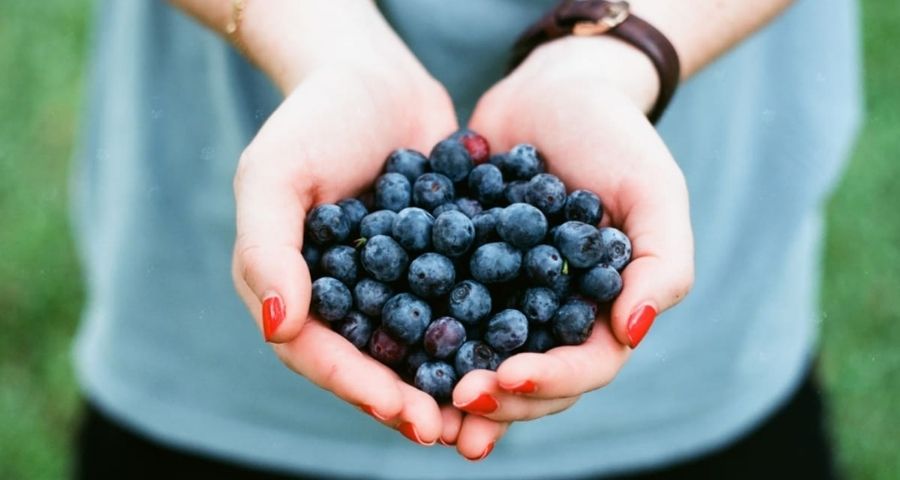
Bilberry Dosage
How Much Bilberry Should I Take Daily?
There is not enough scientific research to provide a recommended dose of bilberry. However, a typical dose of ripe berries (dried) is 20—60 grams daily. Many sources also state that some individuals also drink a type of bilberry tea made from 5 to 10 grams of mashed bilberries. Suggested dosages are —
- Dried Ripe Berries— 20 to 60 grams per day (orally)
- Extracts— 20 to 60 grams per day (orally)
- Tea— 1 cup orally; 1 g dried leaf per 150-milliliter water
- Topical— Apply 10% decoction topically (as required); dried berries boiled in water for decoction
The appropriate dosage of bilberry may depend on several factors including gender, age, weight, and medical history. Consult your doctor to get personalized advice.
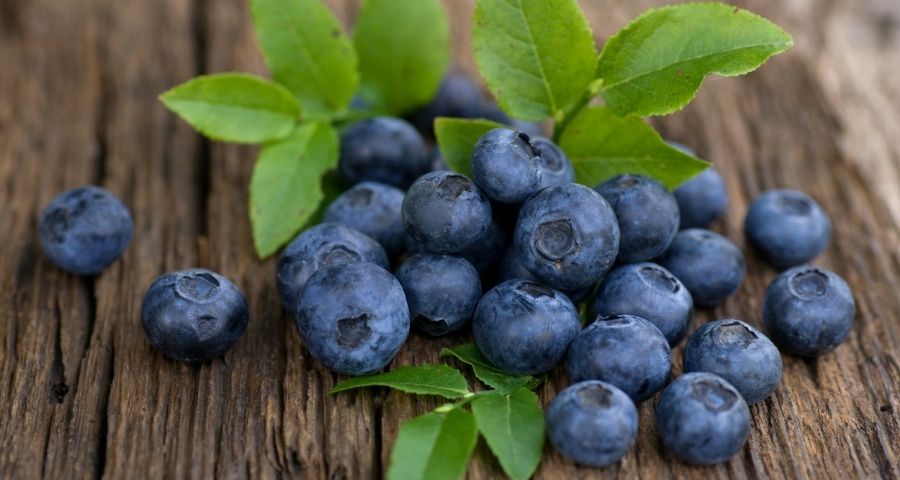
Bilberry Vs Blueberry
What is The Difference Between A Bilberry and A Blueberry?
There is always confusion between bilberry and blueberry fruit. But, one can distinguish the two closely similar fruits by the following differences —
- Bilberry fruit contains much deeper blue color than blueberries.
- Bilberries are very acidic, so the taste of them is completely different from a blueberry. However, bilberries can be consumed in their raw form. Vaccinium myrtillus or European blueberry really shines when cooked and used in jellies, jams, pies and sauces.
- Blueberries are easy to grow and are easily found around the world, whereas bilberries are much rarer.
- Bilberries are the richest source of anthocyanins. Its colorful plant pigments may protect you from free radicals. Whereas, blueberry contains smaller amounts of anthocyanins.
- Bilberry and blueberry both have nearly similar nutritional profile, but bilberries are slightly higher in most of the minerals and vitamins.
- While eating, bilberry fruit will stain your teeth, tongue and hands a deep blue or purple color. It is also used as a dye for food and clothes. Whereas blueberries have flesh of a less intense color and are less staining.
- Bilberries (European blueberries) are usually harvested from wild plants, whereas blueberries are usually cultivated and are widely available commercially.
- When cooked as a dessert, bilberries have a much stronger, more tart flavor and a rougher texture than blueberries.
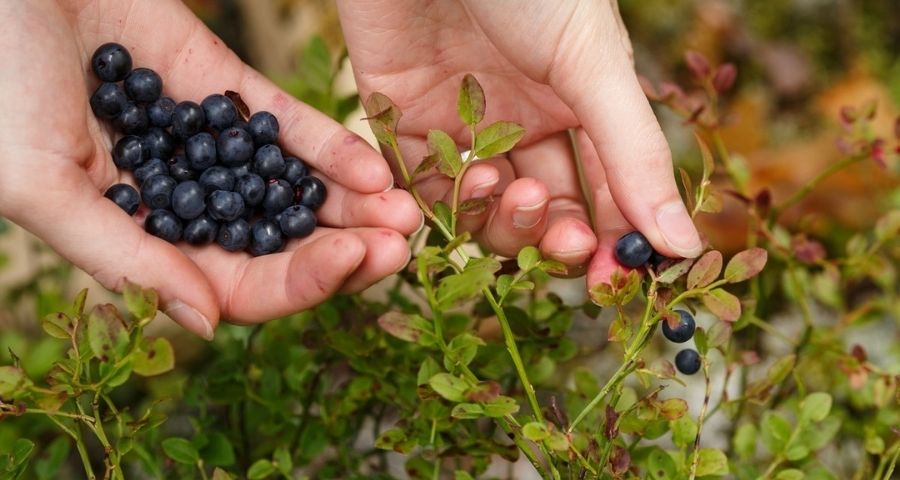
What are The Side Effects of Bilberry?
Common side effects of bilberry may include —
- Anemia
- Yellowing skin and eyes (jaundice)
- Excitation (on overdose)
- May affect blood sugar levels
- Wasting syndrome (cachexia) — muscle loss, weight loss, fatigue, loss of appetite, and weakness
- Bilberry fruit naturally contains substances called tannins. If you have a history of allergy to foods containing tannin, do avoid bilberry
- Bilberry fruit and bilberry leaf extracts may reduce your blood sugar levels
- Pregnant or nursing women should not consume the extracts of bilberry, as safety isn’t known
- Bilberries contain higher amounts of anthocyanins, which may inhibit drugs such as antibiotics, anticancer medications, beta-blockers or medicines for arthritis. High flavonoid consumption from bilberry supplements may increase the risk of bleeding when taken with blood—thinners such as warfarin, NSAIDs, and aspirin
Here, it is advisable that supplements are not tested for safety. You need to use bilberry supplements carefully or under the supervision of your doctor.
Drug Interactions with Bilberry
Some drugs used to treat diabetes may interact with bilberry fruit. It may cause your blood sugar to go too low as diabetes medications are used to lower blood sugar levels. Taking bilberry leaves along with anti-diabetic drugs may also reduce blood sugar.
Some medications used for diabetes include glipizide (Glucotrol), rosiglitazone (Avandia), glimepiride (Amaryl), glyburide (Diabeta, Glynase PresTab, Micronase), insulin, chlorpropamide (Diabinese), pioglitazone (Actos), tolbutamide (Orinase) and others.
How to Add Bilberries to Your Diet?
You can add bilberries into your diet in many ways. You can consume them in their raw or dried form.
Bilberries make a great addition to muffins, pancakes, and other baked products. You can also include bilberries in salads, oatmeal, smoothies, and yogurt parfaits. In addition to this, you can also use them to make jam or just simply mash a handful of blueberries with a fork to use as a quick spread on your toast.
What’s more, bilberry supplements are an alternative way to include this fruit in your daily diet.
Take Away
Bilberries (Vaccinium myrtillus) are small European blueberries that are rich in many healthful nutrients and beneficial compounds. It may help to reduce inflammation, and blood sugar levels, and improve vision and heart health. Bilberry fruit may even improve the functioning of the brain, fight—off bacteria, and help to reduce the symptoms of ulcerative colitis. Like other berries, bilberries are a healthy addition to your diet !!
REFERENCES:
- An overview of the evidence and mechanisms of herb–drug interactions; Authors: Pius S. Fasinu, Patrick J. Bouic and Bernd Rosenkranz.
- Using dietary supplements wisely; U.S. Department of Health and Human Services. National Center for Complementary and Integrative Health; Updated January 2019.
- Bilberries; Medical and Pharmacy Editor: John P. Cunha, DO, FACOEP.
- Bog bilberry phenolics, antioxidant capacity and nutrient profile; Authors: Nesrin Colak, Hülya Torun, Jiri Gruz, Miroslav Strnad, Isidro Hermosín-Gutiérrez, Sema Hayirlioglu-Ayaz and Faik Ahmet Ayaz; PMID: 26868586. DOI: 10.1016/j.foodchem.2016.01.062.
- Ginkgo biloba extract and bilberry anthocyanins improve visual function in patients with normal tension glaucoma; Authors: Seong Hee Shim, Joon Mo Kim, Chul Young Choi, Chan Yun Kim, Ki Ho Park; PMID: 22870951, PMCID: PMC3429325. DOI: 10.1089/jmf.2012.2241.
- The effect of a natural, standardized bilberry extract (Mirtoselect®) in dry eye: a randomized, double blinded, placebo-controlled trial; Authors: A Riva, S Togni, F Franceschi, S Kawada, Y Inaba, R Eggenhoffner, L Giacomelli, PMID: 28617532.
- Bilberry extract supplementation for preventing eye fatigue in video display terminal workers; Authors: Y Ozawa, M Kawashima, S Inoue, E Inagaki, A Suzuki, E Ooe, S Kobayashi and K Tsubota; PMID: 25923485, DOI: 10.1007/s12603-014-0573-6.
- Bilberry (Vaccinium myrtillus L.); Authors: Wing-kwan Chu, Sabrina C. M. Cheung, Roxanna A. W. Lau, and Iris F. F. Benzie; Herbal Medicine: Biomolecular and Clinical Aspects. 2nd edition.
- Anthocyanins inhibit nuclear factor-kappaB activation in monocytes and reduce plasma concentrations of pro-inflammatory mediators in healthy adults; Author: Anette Karlsen, Lars Retterstøl, Petter Laake, Ingvild Paur, Siv Kjølsrud Bøhn, Leiv Sandvik, Rune Blomhoff; PMID: 17634269. DOI: 10.1093/jn/137.8.1951.
- Bilberry juice modulates plasma concentration of NF-kappaB related inflammatory markers in subjects at increased risk of CVD; Authors: Anette Karlsen, Ingvild Paur, Siv K Bøhn, Amrit K Sakhi, Grethe I Borge, Mauro Serafini, Iris Erlund, Petter Laake, Serena Tonstad, Rune Blomhoff; PMID: 20119859. DOI: 10.1007/s00394-010-0092-0.
- What do herbalists suggest to diabetic patients in order to improve glycemic control? Evaluation of scientific evidence and potential risks; Authors: A F G Cicero, G Derosa and A Gaddi; PMID: 15666575. DOI: 10.1007/s00592-004-0150-2.
- Current developments on the inhibitory effects of berry polyphenols on digestive enzymes; Authors: Gordon J McDougall, Nimish N Kulkarni and Derek Stewart; PMID: 19706974. DOI: 10.1002/biof.5520340108.
- Dietary anthocyanin-rich bilberry extract ameliorates hyperglycemia and insulin sensitivity via activation of AMP-activated protein kinase in diabetic mice; Authors: Masahito Takikawa, Seiya Inoue, Fumihiko Horio and Takanori Tsuda
- A single supplement of a standardised bilberry (Vaccinium myrtillus L.) extract (36 % wet weight anthocyanins) modifies glycaemic response in individuals with type 2 diabetes controlled by diet and lifestyle; Authors: Nigel Hoggard, Morven Cruickshank, Kim-Marie Moar, Charles Bestwick, Jens J Holst, Wendy Russell and Graham Horgan; PMID: 25191571, PMCID: PMC4153034. DOI: 10.1017/jns.2013.16.
- Fasting serum hippuric acid is elevated after bilberry (Vaccinium myrtillus) consumption and associates with improvement of fasting glucose levels and insulin secretion in persons at high risk of developing type 2 diabetes; Authors: Vanessa Df de Mello, Maria A Lankinen, Jaana Lindström, Riitta Puupponen-Pimiä, David E Laaksonen, Jussi Pihlajamäki, Marko Lehtonen, Jaakko Tuomilehto, Marjukka Kolehmainen, Matti Uusitupa, Riitta Törrönen and Kati Hanhineva; PMID: 28556578.DOI: 10.1002/mnfr.201700019.
- Vitamin K; National Institutes of Health.
- Favorable effects of berry consumption on platelet function, blood pressure, and HDL cholesterol; Authors: Iris Erlund, Raika Koli, Jukka Marniemi, Pauli Puukka, Georg Alfthan, Pirjo Mustonen, Pirjo Mattila and Antti Jula; PMID: 18258621. DOI: 10.1093/ajcn/87.2.323.
- Anthocyanin supplementation improves serum LDL- and HDL-cholesterol concentrations associated with the inhibition of cholesteryl ester transfer protein in dyslipidemic subjects; Authors: Yu Qin, Min Xia, Jing Ma, YuanTao Hao, Jing Liu, HaiYing Mou, Li Cao and WenHua Ling; PMID: 19640950. DOI: 10.3945/ajcn.2009.27814.
- Bilberries; emedicine health. Reviewed on 9/17/2019.
- The Health Benefits of Bilberry; The Anti-Oxidant Rich Fruit May Help Reduce Inflammation; Author: Cathy Wong; Medically reviewed by Arno Kroner, DAOM, LAc.
- 5 Potential Bilberry Benefits That Make This Blueberry Cousin Worth Knowing; Author: Isadora Baum. August 10, 2020.
- Anthocyanin-enriched bilberry and blackcurrant extracts modulate amyloid precursor protein processing and alleviate behavioral abnormalities in the APP/PS1 mouse model of Alzheimer’s disease; Authors: Saila Vepsäläinen, Henna Koivisto, Elina Pekkarinen, Petra Mäkinen, Gary Dobson, Derek Stewart, Annakaisa Haapasalo, Gordon J McDougall, Reijo O Karjalainen, Heikki Tanila, Mikko Hiltunen; PMID: 22995388. DOI: 10.1016/j.jnutbio.2012.07.006.
- Cytotoxic effects of bilberry extract on MCF7-GFP-tubulin breast cancer cells; Authors: Vy Nguyen, Jessica Tang, Emin Oroudjev, Choong Jae Lee, Cecilia Marasigan, Leslie Wilson, George Ayoub; PMID: 20132040. DOI: 10.1089/jmf.2009.0053.
